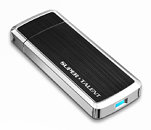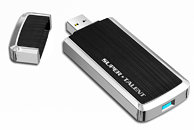Wednesday, November 4th 2009
Super Talent Announces World's First USB 3.0 RAIDDrive
Super Talent Technology, a leading manufacturer of Flash storage solutions and DRAM memory modules, today announced the new SuperSpeed USB 3.0 RAIDDrive, which supports transfer speeds up to ten times faster than USB 2.0 drives. The new drive, in 32GB, 64GB and 128GB capacities, is fully backward compatible with USB 2.0 ports, but operates at slower speeds.
The USB 3.0 RAIDDrive uses patented "multiple pairs of differential serial data lines technology" for optimal NAND flash performance. "This product underscores Super Talent's continued leadership in USB drives." said Super Talent COO, C.H. Lee. "We've developed the world's first mobile USB 3.0 flash drive. It delivers phenomenal performance and it incorporates our own patented technology".Measuring 95 x 37 x13.5 mm, the SuperSpeed drive is a truly portable drive. Like most USB drives, it requires no separate cable. It plugs directly into any USB port. Although this drive will work in USB 2.0, it delivers transfer speeds up to 200 MB/sec only in USB 3.0 ports. Using a separate UAS Protocol driver with a USB 3.0 port this SuperSpeed drive can reach up to 320 MB/sec transfer speeds. This product will be available in December from Super Talent resellers worldwide. Interested parties can register here for USB 3.0 product availability updates.
The USB 3.0 RAIDDrive uses patented "multiple pairs of differential serial data lines technology" for optimal NAND flash performance. "This product underscores Super Talent's continued leadership in USB drives." said Super Talent COO, C.H. Lee. "We've developed the world's first mobile USB 3.0 flash drive. It delivers phenomenal performance and it incorporates our own patented technology".Measuring 95 x 37 x13.5 mm, the SuperSpeed drive is a truly portable drive. Like most USB drives, it requires no separate cable. It plugs directly into any USB port. Although this drive will work in USB 2.0, it delivers transfer speeds up to 200 MB/sec only in USB 3.0 ports. Using a separate UAS Protocol driver with a USB 3.0 port this SuperSpeed drive can reach up to 320 MB/sec transfer speeds. This product will be available in December from Super Talent resellers worldwide. Interested parties can register here for USB 3.0 product availability updates.



26 Comments on Super Talent Announces World's First USB 3.0 RAIDDrive
its barely above sata II speeds (320MB/s vs 300MB/s)
speed is not the awesomeness, its USB 3.0 - and a product that can truly make use of it
To state my comment, he did say 10 times faster than USB2 transfer speeds, and those are around 30-35 MegaByte/s.
So i would say that is a HUGE step up from the regular SATA2 drives.
the 90MB/s you're thinking of is mechanical drive speeds
its not. sata 3GB is 300MB/s, which is about the same as USB 3.0
i drew the comparison that this is nothing more than a SATA II (aka 3Gb/s aka 300MB/s) SSD, converted to a USB 3.0 interface
Still, very nice product, do want :toast:
With any luck Santy' Claws will bring me one for Xmas... :)
It's pretty sweet. I might be able to justify buying an ASUS U3S6 card now.
"We [have also] learned that Intel is postponing USB 3 introduction until 2011. With no competition in chipsets, it seems Intel has decided that innovation is not needed for USB any time soon," said Burke. "With no one to push Intel to innovate, PC enthusiasts are left with Intel chipsets and the features and performance they deliver, or lack there of."
www.tgdaily.com/hardware-features/44493-nvidia-our-nforce-chipsets-are-qbetterq-than-intels
BOO Intel.
Of course it doesn't bottleneck its bandwidth in any way. That is not even logical.
It does, however, makes it a lousy OS drive, if the latency of USB 3.0 is anything near that of USB 2.0.
You can have 500MB/s sustained bandwidth on a USB 2.0 flash drive, but if the latency is anything above 20ms, which I think it will, the reason for buying this device will be null.
If USB had great latency, everyone would be using it. But their awful latency is why everyone frowns upon any kind of video or audio device connected to USB, even whilst it has sufficient bandwidth.